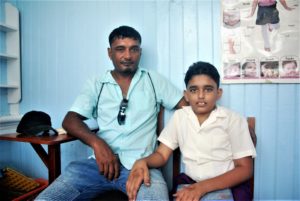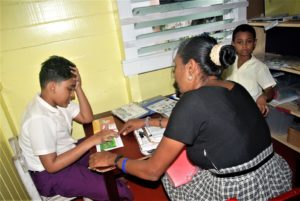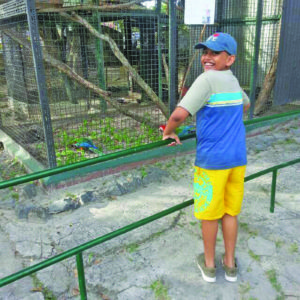– A Parents Perspective
By Lakhram Bhagirat

Shoaib Khan is nine years old. He is tall and likes to smile a lot but most of all he loves his gadgets. He is a whiz when it comes to memorising passwords, patterns and lock codes, but, Shoaib likes to be alone. He is a special kind; he does not conform to societal norms, not because he does not want to, but because he just cannot. You see the upbeat Shoaib has been diagnosed with moderate to severe autism for the past six years.
Shoaib’s father, Shameer Khan, says his son was born normal but remained that way until he was approaching his third birthday. He began displaying signs consistent with an autistic child but his parents had never heard of Autism Spectrum Disorders (ASDs) nor was any doctor within the public healthcare system able to properly diagnose him.
As time progressed, Shoaib stopped speaking to his parents and even ceased looking at them when they spoke to him. Eventually, the situation deteriorated to the extent where Shoaib started to vigorously bite himself whenever he got angry posing as a danger to himself. Concerned for her son’s safety, his other , Faith Khan, took Shoaib to a private hospital where he was formally diagnosed with autism and referred to the Step by Step Foundation.
For the past six years, Shoaib has been a student at the Step by Step School and according to his father, he has seen tremendous improvements in his son’s condition.

“When he first come here to the school he wasn’t using the toilet and so. He never used to watch you when he talk and he does cry and bite heself up but now he does control heself and I am glad this school is helping he,” Shameer said.
At the Step by Step School Shoaib is being taught basic life skills like how to tie his shoe, eat by himself and dress prope
rly. He would not have acquired these skills had he been undiagnosed or hidden away by his parents in fears of being stigmatised. Nevertheless, his parents embraced his uniqueness and enrolled him into the Step by Step School, despite the common gossip from members of society.
The Khans have four other children apart from Shoaib and according to them, he has been the centre of their universe, as their youngest child. They praised their other children for being strong enough to support their brother and caring for him even when they were not around.
Presently, Faith resides in the United States with Shoaib’s other siblings and has been actively pushing for him to join her and his other siblings. Faith says it is hard for her to be away from her baby when he needs her, but she remains confident in his father’s abilities to care for him while preparations are in the pipeline to have the two of them move to the US.
It is quite rare for a father, especially of a child with high dependency as Shoaib, step up to the plate and take the responsibility to care for that child.
To fully understand the life altering implications of the diagnosis, the Times Sunday Magazine sat down with Shameer.
The first thing Shameer stressed was that it takes patience, and lots of it too, to live with and care for an autistic child . He however noted that as a parent, he simply could not abandon his responsibility to care for his son. During the initial stages of his diagnosis, Shoaib would throw tantrums and simple changes would upset him to the extent where he would bite himself until it bleeds.

Shameer further added that this behavioral pattern has improved tremendously to the point where Shoaib would accept changes in small doses. He said Shoaib is fun and now learning social skills.
“Before he never used to play with the other children them and so and even until now he don’t go outside off he own and play but if me or somebody else take he outside he will play. Somebody always have to be around he or he would get scared,” Shameer says.
He added that his son would not sleep without him being present and they would spend more of their free time with his tablet exploring the world of the internet or attempting to read a book.
A lot of time is invested into molding him to be somewhat independent and that investment is paying off. Shameer urges parents to be aware and observe their children so that they can catch the signs of autism at an early stage and seek intervention. He also advised that they should be tolerant despite what society thinks because the only thing an autistic child need is unconditional love from the people who are supposed to love them. (Guyana Times Sunday Magazine)



